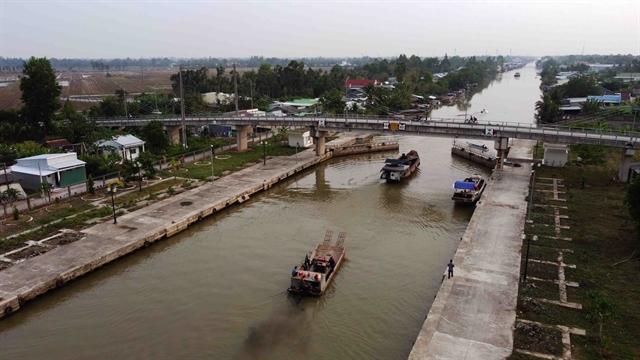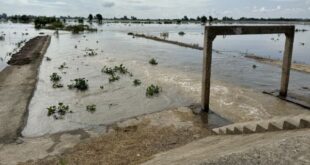 |
| The Vũng Liêm saltwater prevention sluice in Vĩnh Long Province’s Vũng Liêm District serves irrigation for the south Mang Thít region in the Cửu Long (Mekong) Delta provinces of Vĩnh Long and Trà Vinh. — VNA/VNS Photo Vũ Sinh |
HCM CITY — Local authorities in the Cửu Long (Mekong) Delta are taking proactive measures to cope with saltwater intrusion and drought in the 2023-24 dry season.
The delta, which is the country’s largest producer of rice, fruit and seafood, is forecast to face saltwater intrusion between January and March next year.
Saltwater with salinity of 4 grammes per litre is estimated to enter 50-60km into river mouths during the period.
Most plants can only tolerate salinity of 1 gramme per litre.
The water of the Mekong River flowing into the delta in the dry season is estimated to be 5-10 per cent lower than the average of many years.
Saltwater intrusion and drought will affect about 43,300ha of fruits and 50,000ha of the upcoming winter-spring rice, according to the Directorate of Water Resources.
The rice and fruit areas are located in Long An, Tiền Giang, Bến Tre, Trà Vinh and Sóc Trăng provinces.
The delta, which comprises Cần Thơ City and 12 provinces, plans to grow about 1.5 million hectares of winter-spring rice, up 22,000ha from last year.
Winter-spring rice is the delta’s main rice crop of the year.
Nguyễn Văn Mẫn, director of the Tiền Giang Province Department of Agriculture and Rural Development, said the province planned to grow 44,760ha of winter-spring rice and was taking measures to cope with saltwater intrusion and drought to secure a good harvest for farmers.
The province had scheduled to sow the rice crop between November 10 and the end of this year depending on conditions of each locality, he said.
To serve agricultural production and prevent saltwater intrusion, Tiền Giang had tightened checking saltwater prevention sluices and embankments and encouraged farmers to store fresh water for irrigation, he said.
Tiền Giang, which is the country’s largest fruit producer, is building six sluices and embankments along the Tiền River, a tributary of the Mekong River, to prevent saltwater intrusion and store fresh water for agricultural production.
When saltwater intrusion increases during the winter-spring rice crop, the province will close three saltwater prevention sluices at Trà Tân, Ba Rày and Phú An estuaries.
Local authorities in the delta have tightened monitoring saltwater intrusion to inform the public to take prevention measures.
They have encouraged households to store rain water and fresh water to serve household use and agricultural production in the dry season.
In Trà Vinh Province, its Department of Agriculture and Rural Development has encouraged farmers to apply advanced farming techniques, switch to grow suitable crops and sow winter-spring rice following guided schedules in each locality.
The department has asked localities to complete building irrigation projects on schedule this year, including building 380 in-field irrigation projects.
It has instructed local Bureaus of Agriculture and Rural Development in co-operation with the province’s Irrigation Work Exploitation and Management One Member Ltd. Co to check and operate sluices properly to store fresh water for rice, fruit and other crops.
Located between the Tiền and Hậu rivers, two tributaries of the Mekong River, and bordering the sea, Trà Vinh is one of the delta’s provinces which are hardest hit by saltwater intrusion.
Neighbouring Trà Vinh, Bến Tre Province is also taking prevention measures such as digging ponds and using huge plastic bags and other water containers to store fresh water.
Huỳnh Quang Đức, deputy director of the Bến Tre Department of Agriculture and Rural Development, said the province was boosting the construction of saltwater prevention projects and planned to build temporary dams to secure fresh water for household use and agricultural production.
The department had instructed farmers on measures to protect crops, including not letting trees have fruits during saltwater intrusion and drought periods, pruning branches and keeping soil moist to protect them, he said. — VNS
- Reduce Hair Loss with PURA D’OR Gold Label Shampoo
- Castor Oil Has Made a “Huge” Difference With Hair and Brow Growth
- Excessive hair loss in men: Signs of illness that cannot be subjective
- Dịch Vụ SEO Website ở Los Angeles, CA: đưa trang web doanh nghiệp bạn lên top Google
- Nails Salon Sierra Madre
 VnExpress News The News Gateway of Vietnam
VnExpress News The News Gateway of Vietnam





